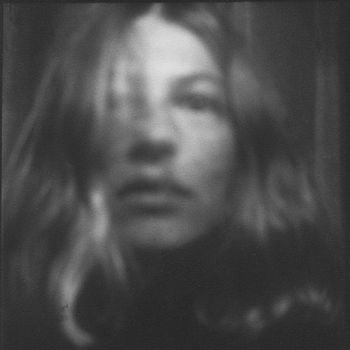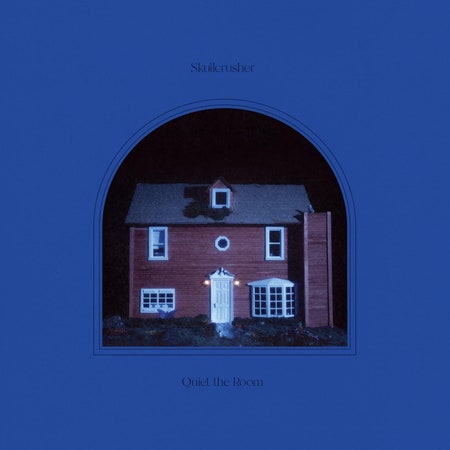Indigo Sparke – ‘Hysteria’

Sounds like… louder realisations of life’s lessons.
Written in early 2020 and fully realised two years later, Hysteria grows from the crops of Echo’s turned soil. With the same direction (inward) and a new display (outward), Indigo Sparke’s sophomore record presents joy and turmoil confidently, her voice has gained strength because powerful messages are best delivered with hermitian conviction.
Blue like the Australian artist’s first name opens the record and moves through her history with its many contexts of feeling and being blue. It is personal though never gives away too many details of the hurt endured. The title song connects her own experience with the lives of the women before us, it gives the record a generational feeling. Indigo Sparke is making peace with her past, the desires for her future, and throughout the record, she keeps reminding the listener that they can too reclaim themselves. The record ebbs and flows with mythology and individual retelling, with dashing instrumentalization and ballads. On Infinity Honey which struck me first simply by its title, Sparke gives in to the faith the oracle has predicted for her, coated in ever-sticking sweetness, and hesitant to believe. It’s a metaphor for the turbulence endured in her love life as well as the future that is painted so brightly by women like me, writing about her. In my interview with Indigo Sparke which happened a couple of days before the release, she was calm and honest with freshly washed hair and overwhelmed by the whirlwind of attention which was about to begin. An inkling of the essence of Hysteria might has been present at that moment – anticipating the new by fully committing to the immediate unknown with trust in everything learned over the past. (Anna Stich)
Stream It: ► Spotify / ► Apple Music / ► Bandcamp
Ultraflex – ‘Infinite Wellness’

Sounds like … sensual retro-pop, fuelled by love and friendship.
When Icelandic artist Katrín Helga Andrésdóttir aka Special-K and her Norwegian friend Kari Jahnsen aka Farao first joined forces as Ultraflex towards the beginning of the global pandemic their music was a much needed of joyful relief. Visions Of Ultraflex was a retro-driven pop gem that delivered cheesy synthpop with lots of charm, a little bit of humour but also lots of dignity and respect for the craft and the influences, resulting in hidden little pop gems and memorable lyrics like ”I took your virginity in Manchester United sheets”. Over the course of the time, that fun side-project got a life of its own, creating a little buzz and scoring and Icelandic Music Award for best electronic album. With the follow-up Infinite Wellness it almost feels as if the former side-project is on the verge of becoming a main focus for these two talented artists. It wouldn’t be the worst thing to happen, I got to say. On the (unfortunately) only eight-track long sophomore LP Ultraflex once again dive deeply into the territory of 80s synthpop, early 90s R&B, euro pop, funk and tropical house.
The beats remain tight, the basslines sharp and the bubbling synth chimes as cheesy as they are blissful. And of course, you got Farao and Special-K once again playing the sensual crooners. “Absorb the moisture until you glow“ they say on the opening Relax which takes things a bit more subtle before Baby goes into full pop mode. On the Kuntessa-featuring Mi Vuoi the duo flirts a bit with 90s eurotrance sounds and the shimmering Mediterranean party anthem Rhodos heads for same territory. Reminiscing about a time that might ultimately be gone you’re getting a lot of fun out of lines like “Mascara down your cheeks, Bacardi in your drinks.” What’s so fun about the Ultraflex sound is that you don’t know where the irony starts and where it ends. Sexual tension pours out of almost everything like sweat out of dancing body but it comes in a very empowering way where the whole playfulness in the songs also works as a message of independency. And it’s often packed in profound songwriting like the mighty tropical power ballad Melting Away. Like on their debut album Ultraflex deliver infectious joy and honest fun while not shying away from a certain level of cheesiness. There aren’t many groups around who can walk that fragile line so easily and I hope more people are ready to fall for the magical spell of these two. (Norman Fleischer)
Stream It: ► Spotify / ► Apple Music / ► Bandcamp
Bonny Light Horseman – ‘Rolling Golden Holy’
Sounds like … a glistening experience.
When Bonny Light Horseman’s self-titled debut was brought to the surface in the overloaded year of 2020, their traditionally tinged down-to-earth folk felt like a resurrection of the genre of sorts and was by far the most candid and precious folk record of the year. Now with their sophomore LP Rolling Golden Holy, released earlier in October, the so-called supergroup around
Anais Mitchell, Josh Kaufman, and Eric D. Johnson (Fruit Bats) takes their followers and admirers into another heavenly sphere of swelling harmonies, light-hearted anthems for the restless, and most of all, it ponders on the question where traditional folk music ends and where modern folk music begins – or are the two merged into one after all? Rolling Golden Holy dares to step into that void again, that much is for sure.
The experience of Rolling Golden Holy is one of utmost unification, in the most purified form. The tender and yet fragile opener Exile initiates the reign of mellow and captivating song material, as the following Comrade Sweetheart steps into the light with achingly beautiful vocal harmonies. It does not take much to find that this record is about creating a well-shaped continuum between the allure of the unspoken and the verbalised quest for finding love, hope and trust. Their musical mode remains in that air, rarely shifting away from the rolling acoustic crests. Someone To Weep For Me, driven by a soft upbeat and carefully measured guitar strokes, has a gospel-like quality (“And I dreamed of Jacob’s ladder / When I laid me down to sleep / And the souls all rising and falling / Through the hole of eternity”) and shows how to take a Peter, Paul and Mary quality and adapt it to the new millennium. And that goes for the whole of the record, in the end. Welcome to the Rolling Golden Holy, welcome to yet another wondrous folk happening. (Andreas Peters)
Stream It: ► Spotify / ► Apple Music / ► Bandcamp
Charlotte Dos Santos – ‘Morfo’
 Sounds like … soul-searching contemporary RnB meets Bossa Nova.
Sounds like … soul-searching contemporary RnB meets Bossa Nova.
There is a blue butterfly landing on your hand. It flaps its wings, and you observe it for a moment barely feeling the touch of its fragile legs on the calloused skin of your fingers. Gentle fragility, yet the animals have the confidence to land on your hand. That is what Charlotte Dos Santos new record sounds like. The Norwegian-Brazilian singer explores her roots in an elaboration of warm RnB mixed with Bossa Nova and jazz influences.
The record Morfo follows the artists release Cleo in 2017 and Harvest Time from 2020 and is a continuation of the smooth vocal driven RnB Charlotte Dos Santos is known for. Titled after the blue iridescent butterfly “Morpho Didius”, which is local to the Brazilian and Amazon forests, Morfo is an attempt to engage with personal roots. While songs like Filha Do Sol is sung in a mixture of Portuguese and English and incorporates the complex negotiation of cultural identity – of the artist growing up Afro-Brazilian in Norway – most of the songs are explorations of love and relationships. It is sensual record more than anything. The celestial vocal of Dos Santos gives the theme of soul-searching an audible body and balance the vulnerability with confidence. Just Sayin’ is a contemporary jazz anthem fusing slang words and abbreviation with eloquent nu-jazz arrangements and experimental dynamics. The Player and The Fool incorporates the organic sound of chirping birds into its sweeping RnB ballad and Crooked House has distorted vocal parts on which she sings “I’m going insane” giving the message another spin and rhythm-driven verses. Charlotte Dos Santos closes the record with Aria 4 Arien. On the last song, the artist ends in dramatic string orchestration just to allow space to breathe the last spoken words into your ear – “So what do you say? Let’s make it work” she whispers. And there is only one answer to that question. (Liv Toerkell)
Stream It: ► Spotify / ► Apple Music / ► Bandcamp
Skullcrusher – ‘Quiet The Room’
Sounds like … heading into a warm and meditative space.
Those of you who have been following our blog for a while will know that we have been rooting for Helen Ballentine alias
Skullcrusher from her very first releases, and our love has never stopped since then. Well, at least not mine. Quiet The Room is the first full-length of the LA-based singer-songwriter and within the space of the fourteen songs (!) she constructs a complex and detailed interior of human passion, fantasies, fears and hopes. “It is like layers of tracing paper, like someone is trying to make a drawing and you are seeing the entire process”, she states about the record’s construction. Well, it certainly is an invitation into the artist’s personal space, and what an enthralling one.
Downbeat and equipped with a meditative feel by means of slowly swinging acoustic chords, Skullcrusher creates a dreamlike space, making you fall right into the seductive waves of her own silence. They Quiet The Room builds the basis for the following minutes of Ballentine’s studies in tranquility. Certainly there is a darkness creeping through the cracks of the songs, and yet, it feels so much at home in these tracks. Whatever Fits Together, an airy and seemingly weightless listening experience is one of the more rhythmic pieces and floats along with tender fashion, as Lullaby In February or Pass Through Me cool down the temperature to an existential minimum, the latter one referencing a recurring childhood dream. “Fantasy is so much a part of how I’ve learned to exist in the world”, Ballentine states and as much as the distinct pieces are born out of imagination, they circle back to memories, merging into the ephemeral air of mystery that never fails to capture and fascinate at the same time. Quiet The Room is an impressive pillar of gracious and timeless beauty that will establish the emerging proficiency of Helen Ballentine. (Andreas Peters)
Stream It ► Spotify / ► Apple Music / ► Bandcamp
Dry Cleaning – ‘Stumpwork’
 Sounds like … dry off-kilter post-punk.
Sounds like … dry off-kilter post-punk.
Can it get any drier? The Londoner quartet Dry Cleaning follow their acclaimed and ferocious debut record New Long Leg from last year with Stumpwork. Known for their spoken-word style talk-rock, the band essentialize their minimalist post-rock approach to music making and hone their core of their musical expression. Stumpwork lives off the trotting basslines by Lewis Maynard almost in communication with the flatlining vocals by Florence Shaw. And she is dryer, wittier, and more unapologetic than ever. The genius in her spoken-word recital of everyday moments lies in her deadpan delivery. “If you are rick you look good / that’s not news”, she says on the opener Anna Calls From the Arctic.
Draining all emotion from their music, the band strike the nerve of the zeitgeist’s numbness following the overflow of stimuli. While the record sounds highly intentional in its minimalism and strategic placement of elements, there is a playful element to the songs, like the under-watery, distorted riffs on Hot Penny Day, the stylized title Kwencky Kups, and the occasional hums and vocalization that slip from Shaw’s lips. Stumpwork is the record that could have only grown from New Long Leg. Minus the high-key power of the debut’s catchy songs, Dry Cleaning break down the core of their music and shine in textured minimalism. Stumpwork is what is left after cutting away the branches – the stump, the core, the things that makes us tick as human beings. Emerging from loss, grief, and detachment of the current times, the record’s clever off-kilterness might just provide a remedy to 21st century malaise. (Liv Toerkell)
Stream It ► Spotify / ► Apple Music / ► Bandcamp
Pip Millett – ‘When Everything Is Better, I’ll Let You Know’
Sounds like … arriving at a safe haven after the storm.
After bursting onto the scene back in 2018 with Make Me Cry, Pip Millett has answered many accumulated biddings and prayers with her debut album When Everything Is Better, I’ll Let You Know. Taking her time, and only sporadically gifting her listenership with gems such as her Lost in June EP in 2020, the Manchester native balanced university and music for three years, to finally debut her first full-length effort, with a refined and versified edge to it as well.
Ever as narratively beautiful as elegantly smooth and jazzy, Millett’s album offers a carefully curated selection of stories about separation, self-love and self-healing. Showcasing a wide range of emotional stages a break-up can ensue or trigger, the songs at times burst with confidence (Slow), or invite to wallow in sadness for a moment, too (Happy No More). This unapologetic vulnerability borders almost to a kind of invasiveness for an external figure to experience, yet, at the same time, allows anyone who listens to her songs to connect with Millett, with Heal probably being the prime example of it on this album. While Downright or Smoking are the more heart-wrenching singles on the record, the songstress envelopes even the saddest aspects of a slowly disintegrating relationship in beautiful and almost haunting vocals that allow to “feel the sad” and emerge stronger for it.
Musically, the songs evoke stylish renditions of the new British soul we have come to know and love from contemporaries like Jorja Smith, Olivia Dean, and even Mahalia. Millett’s strength however lies in certain level of understatement, letting the music swell in its layers and allowing us to discover and appreciate the “hidden” sax samples and snares (All Good) or beautifully crafted beats (Walk Away). With When Everything Is Better, I’ll Let You Know, Millett continues the reign of contemporaries like Joy Crookes or Cleo Sol and joins in updating and innovating the British Neo Soul landscape, while at the same time reserving herself a special spot as a lyrically gifted songwriter and vocally distinctive singer, and we can’t wait for more. (Felicia Aghaye)
Stream It ► Spotify / ► Apple Music
Loyle Carner – ‘Hugo’
 Sounds like… intimate rage.
Sounds like… intimate rage.
Key feature of Loyle Carner’s previous work is his devastating honesty. After moving through love and hurt, friendship and break-ups and honouring his mother on his first two records, hugo centres on fatherhood and the double-edged racism towards mixed-racial people in the UK. The record is full of rage, contemplation, tenderness, and a will to move through it to come out the other side.
A friend told me that the elderly black people he knew who stayed angry till later in life at the accumulating discriminatory everyday experiences, eventually end up becoming bitter and resentful towards everything. We talked about this because I was inexplicably furious at a man assaulting me on my run and I asked how he goes through life so calm, without giving into rage at times, seeing all this unprovoked unfairness. Loyle Carner balances the necessity of expressing his fury with an acceptance of himself, as a father, an artist, someone who allows the depth of feeling. The opening lines of Hate: “Let me tell you what I hate / Everything I ain’t / Everything I’ve done / […] / Let me tell you what I love / That there’s no one above / The thought ‘It is what it is” display this tightrope act poignantly. Following Nobody Knows (Ladas Road) and Georgetown opening with John Agard’s poem Half Caste, both expressing the frustration of being in between black and white identities by being born British-Guyanese. As if Carner stops himself in his step before losing control, the record’s tone turns to quieter, jazzier moments with Speed of Plight and Homerton, “To be the father with the magic up his sleeve / From the roots, to the apple, to the tree’” On hugo, Carner asks how much of his emotionality whichever direction it may take, can he expose while staying a hero for his child. On Blood On My Nikes, he recounts witnessing a murder when he was sixteen and elevating it into the political (circus) that the UK has endured by adding activist Athain Akec’s voice talking about knife crimes. A Lasting Place carries the strongest connection to his sophomore record through its empathetic lyrics over soft piano merging into a voice recording of mother and baby, “What kind of man feels the rage of men and only swallows at his daughter’s fist?”. Loyle Carner is that kind of man. On the cover of hugo, he turns around in the car like parents do when their child lost its pacifier, looking back at his future which is bright if he keeps being this genuine and in tune with his warmth. (Anna Stich)
Stream It ► Spotify / ► Apple Music / ► Bandcamp


